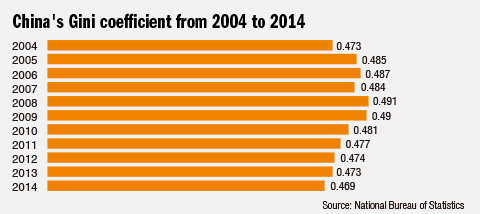How about 2012?
 China gets richer but more unequal
China gets richer but more unequal
About a third of China's wealth held by 1% of citizens, with disparity greatest between affluent east coast and poorer interior
Chinese visitors to a business aviation exhibition walk past a luxury private jet. Photograph: Mark Ralston/AFP/Getty Images
in Beijing
is becoming more unequal as it gets richer, with about a third of the country's wealth now concentrated in the hands of 1% of its citizens, according to new research.
A report by the
also found that the poorest quarter of Chinese citizens owned only 1% of the country's wealth.
The report, which was covered extensively by China's state media, concludes that while the country is getting richer as a whole – the average net worth of a Chinese household rose 17% between 2010 and 2012 to $71,000 (£42,000) – inequality is a serious and growing problem.
It says the country's
, a widely used indicator of economic inequality, has grown sharply over the past two decades.
A Gini coefficient of zero represents absolute equality, while one represents absolute inequality.
About 20 years ago, China's Gini coefficient for family net wealth was 0.45, , a Communist party mouthpiece, but by 2012 it had risen to 0.73.
According to some analysts, societies that have a Gini coefficient of more than 0.40
of widespread social unrest.
gives the US the highest Gini coefficient in the G7, after taxes and transfers, at 0.39, followed by the UK at 0.34 and Italy at 0.32.
In the US,
of the country's wealth.
The Chinese study, which took its data from a large-scale survey conducted by Peking University researchers in 2012, said nearly three-quarters of Chinese household wealth comes from property investments.
"This data is fresh. We know about national wealth, how much everybody's wealth has grown, but we still don't have many numbers on individual wealth," said Li Wei, a sociologist at the Chinese Academy of Social Sciences. "I'm very glad that academic institutions are putting so much work into research, and presenting this data about how our economy is really doing.
"In the future, government departments should take responsibility for collecting this information and presenting it quickly and transparently."
Li said China's biggest wealth discrepancies used to be between rural and urban areas, but a major nationwide urbanisation campaign had narrowed the gap. The greatest economic divisions were now between the affluent east coast and the relatively impoverished interior, and among different areas of individual cities and provinces, he said.
According to a Credit Suisse's
, about 1% of the world's population holds 46% of its total assets. The richest 10% of earners own 86% of all wealth, and the bottom half owns less than 1%.
BTW, that 0.73 figure sounds incredible. I am not sure if that's correct. I think China is around 0.45+. If it is 0.73 we should be seeing civil war by now.





